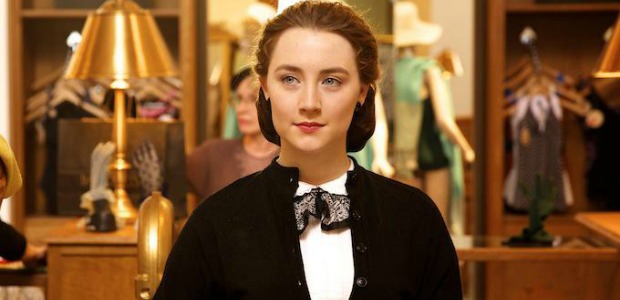Brooklyn’s premise probably won’t immediately grab you. That’s because it’s the story of a young Irish immigrant who relocates to Brooklyn, New York, in the 1950s, and how she struggles to settle. Honestly, that’s about it. But within this framework, it delivers on every cinematic front that it encroaches. Richly evolving, it subtly stirs your emotions through its tender and gloriously simplistic tale, all of which is anchored by a virtuoso leading performance from Saoirse Ronan -- who is simply majestic, emanating a raw magnetism and power that is reminiscent of 50s melodrama, but with a modern nuance and fragility that is just captivating.
Brooklyn is a glorious retreat away from the modern world. Its 1950s period glistens with an alluring nostalgia. Back to an era when everyone’s problems could be solved at a dance, or with a warm embrace and a loving look. It’s far from lightweight though, dealing with considerable, emotional concerns. But the random arrival of real-life complications seem almost beautiful, poetic and integral. They’re dealt with in a real and stoic fashion, not coddled and fawned over. Life has to move on, and while Brooklyn does so at a leisurely and patient pace, it’s always captivating and moving.
The film grows in confidence alongside its lead character. Rather than going for the overly dramatic and shoving its themes down your throat, Nick Hornby’s script - which is cheeky, charming, and filled with impactful dialogue and payoffs - lingers on genuine, evocative moments.
It doesn’t matter whether these are moments of loneliness, isolation, homesickness, nerves or love, there’s alway an honest resonance to chime with. Director John Crowley’s subtle but evocative direction means the emotions always connect, too, while the fact that Crowley has a great eye for an effective image and dawdles just a little longer on shots to give Saoirse Ronan time to resonate makes Brooklyn even more poignant.
John Crowley and Nick Hornby’s work merge together in a powerful and composed fashion. You almost don't notice Brooklyn’s drama building since it escalates through mere glances and longing stares rather than through loud yelling and overt gestures. It also helps that it is exquisitely constructed, too. Even when it does threaten to move into the overly melodramatic, it handles the potential explosion of conflict in a refreshingly realistic and honest manner that doesn’t deviate with what we’ve come to expect from the characters.
While Saoirse Ronan leads the line in a stirring fashion, she’s also provided glorious assistance by a fine ensemble. Emory Cohen’s perpetually sweet Tony Fiorello and Domhnall Gleeson’s stoic Jim Farrell are the men trying to convince Ronan's character, Ellis Lacey, to stay in Brooklyn and Ireland, respectively, and both are lusciously appealing and well-rounded suitors. While merely seeing Jim Broadbent and Julie Walters on-screen provokes the same satisfied feeling that only comes when a tardy passenger sees an even tardier bus on the horizon.
But it’s Brooklyn’s simplicity that’s the real reason for its success. There’s an underlying optimism and a life-affirming beauty to its story. Its old-school, workmanlike toughness and chivalry is refreshingly unglamorous, utterly endearing, and it all results in Brooklyn being the most satisfying film of the year.












